Comparing Various Card Trimmers
Copyright 2011 by James
P. Riser
Click here to go
to my main magic related web page.
Many of the variations of card trimmers produced for
the card cheat were without maker's mark or date of manufacture.
The trimmer images shown here are from various auctions. This
is a very limited selection of my collection of trimmer images
sold over the years but enough to illustrate the possibilities
of using various features to roughly date such items.
I suggest that dating such card trimmers might be assisted
by looking at the features of the individual trimmers. What do
you think?
Ivory handles were a common item during a certain date
range. These trimmers feature such handles.
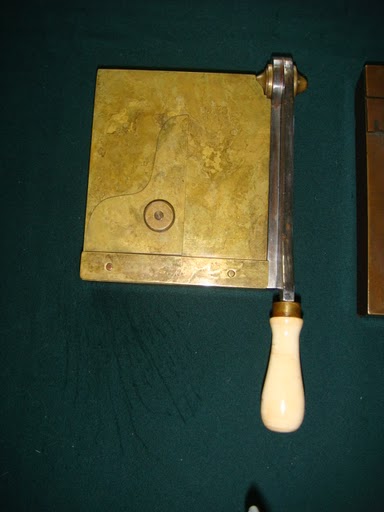 Note that this
trimmer does not feature angle adjustment other than by guess.
These two trimmers show different adjustments.
Note that this
trimmer does not feature angle adjustment other than by guess.
These two trimmers show different adjustments. 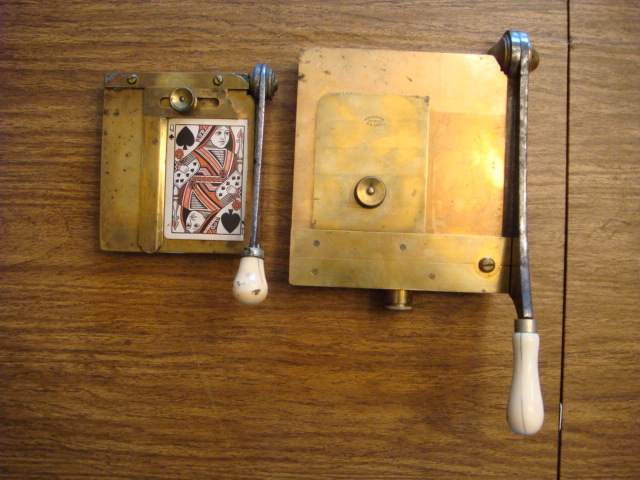 The ivory handled trimmer on the right above seems
to be one of the earliest examples of controlled angle adjustment.
Here is another ivory handled trimmer.
The ivory handled trimmer on the right above seems
to be one of the earliest examples of controlled angle adjustment.
Here is another ivory handled trimmer.
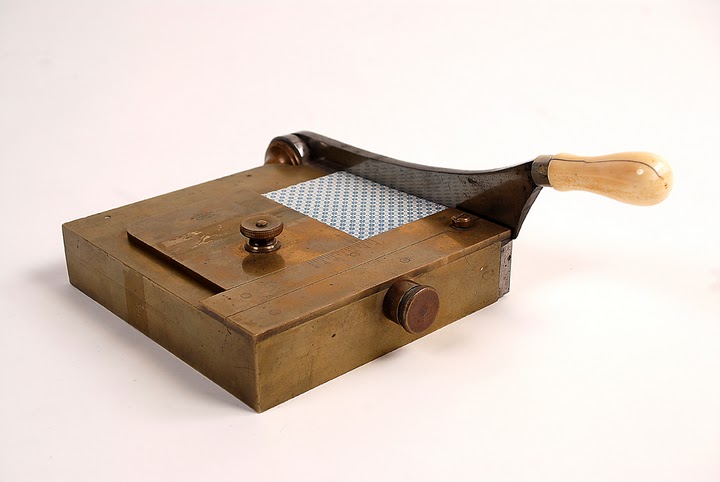 Ebony handles were also common during this same time
period and for a number of years after. Notice that adjustments
are still rather basic. Perhaps some regions of the world were
aware of the improved adjustments before others.
Ebony handles were also common during this same time
period and for a number of years after. Notice that adjustments
are still rather basic. Perhaps some regions of the world were
aware of the improved adjustments before others.
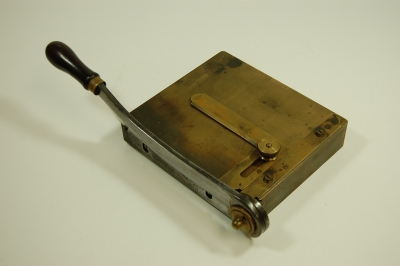
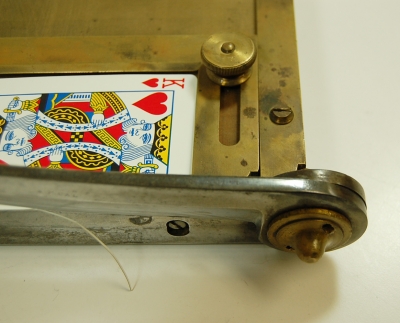 Cast ornamental handles might indicate the country
of origin for a specifiic trimmer. Notice that this trimmer allows
much better angle adjustment and card width adjustment.
Cast ornamental handles might indicate the country
of origin for a specifiic trimmer. Notice that this trimmer allows
much better angle adjustment and card width adjustment.
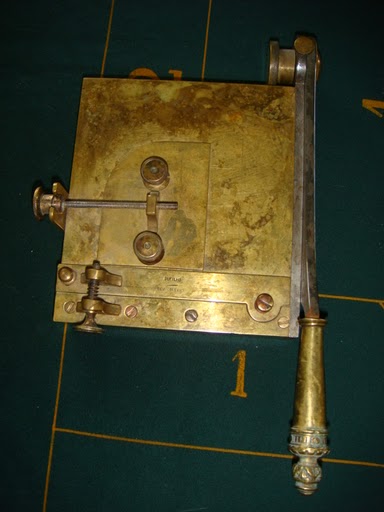 Even this wooden base trimmer allows better adjustments
than the ivory or ebony handled trimmers. Such refinements would,
to me, indicate a more recent development.
Even this wooden base trimmer allows better adjustments
than the ivory or ebony handled trimmers. Such refinements would,
to me, indicate a more recent development.
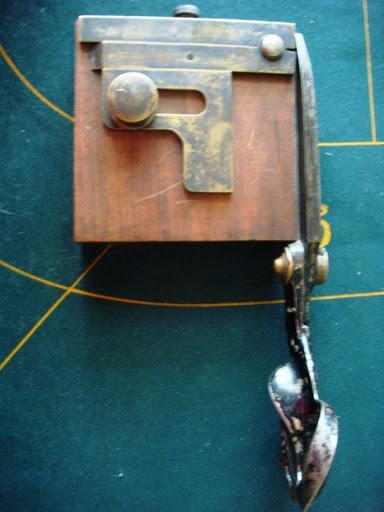 Seen below is another wooden base trimmer - top and
bottom.
Seen below is another wooden base trimmer - top and
bottom.
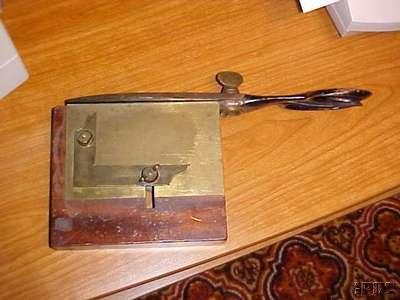
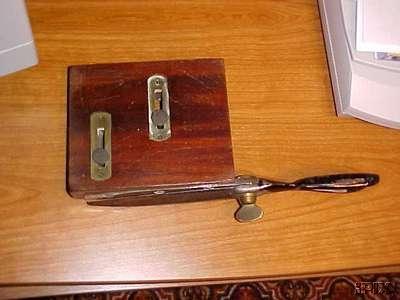 Another wooden base trimmer ...
Another wooden base trimmer ...
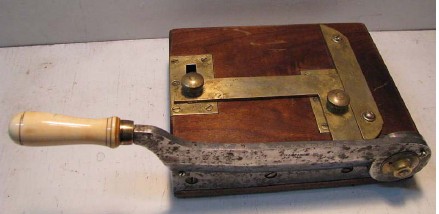
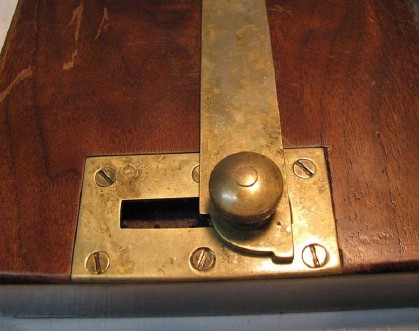 One more wooden base trimmer.
One more wooden base trimmer.
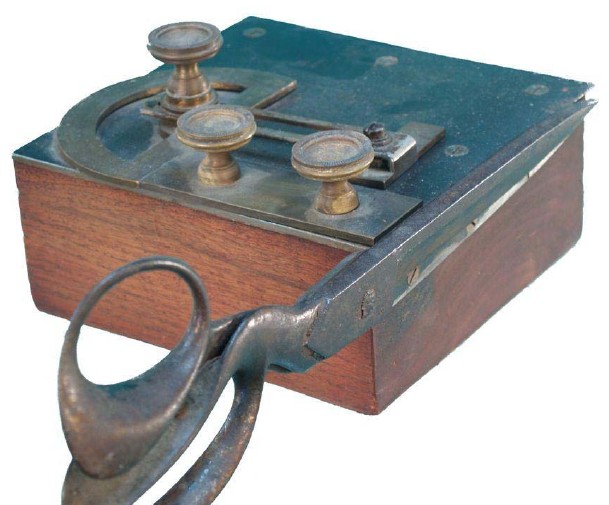 Below is an interesting brass topped wooden based model.
Below is an interesting brass topped wooden based model.
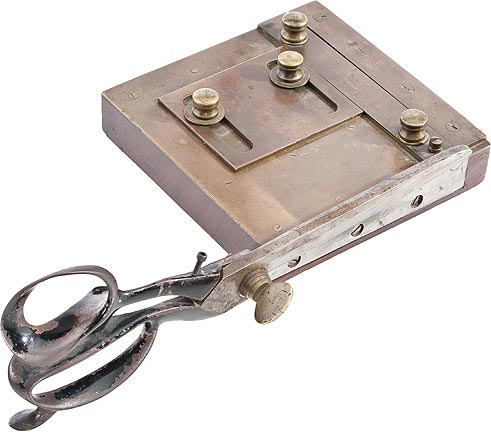 Notice the length of cut adjustment screw on the scissors.
Notice the length of cut adjustment screw on the scissors.
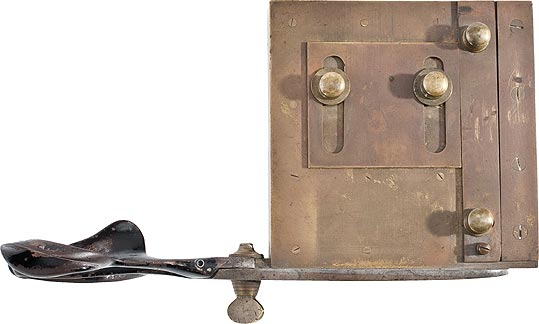 And the bottom showing the brass connector plates for
bolt ends.
And the bottom showing the brass connector plates for
bolt ends.
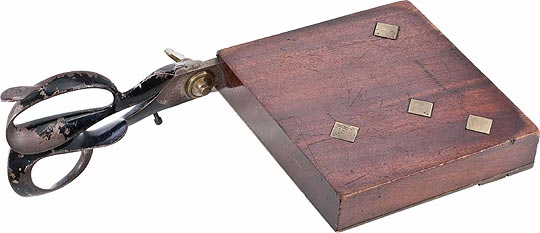 This is a well designed apparently custom made trimmer.
This is a well designed apparently custom made trimmer.
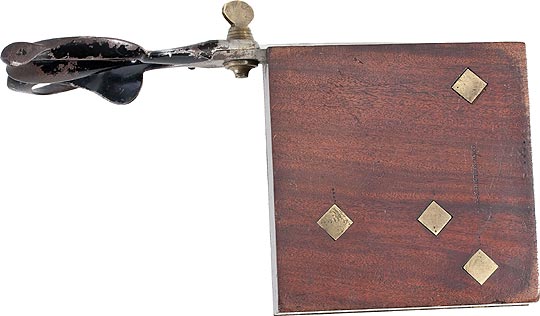
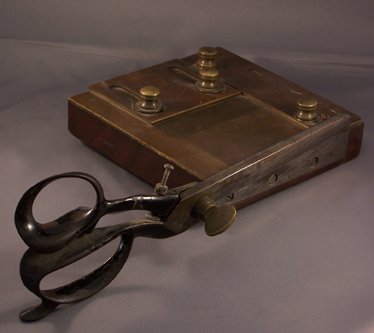
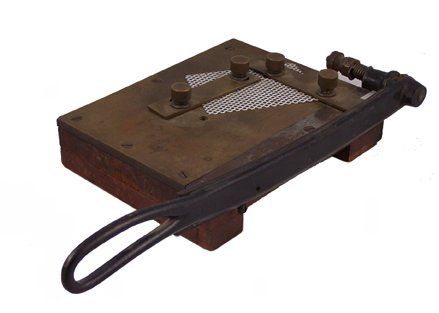
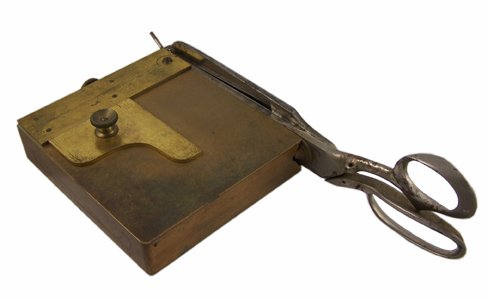 This Mason trimmer seems to have evolved from the previous
trimmers but features better construction.
This Mason trimmer seems to have evolved from the previous
trimmers but features better construction.
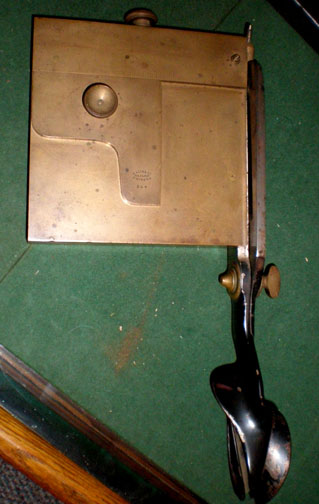 Another Mason trimmer. Do not ask why the owner "cleaned
it up".
Another Mason trimmer. Do not ask why the owner "cleaned
it up".
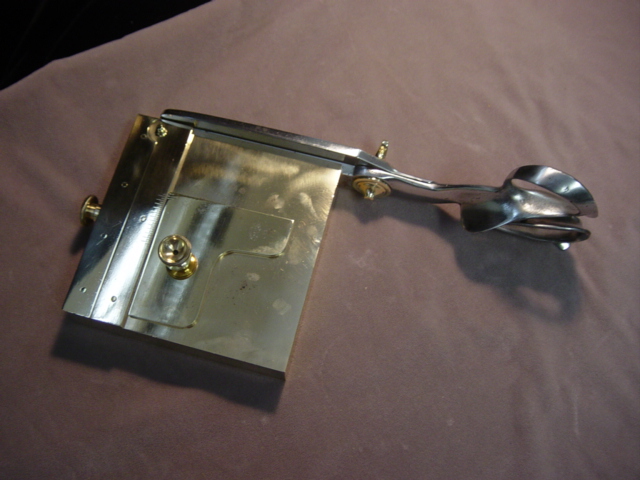 In cleaning it up the owner removed the brass plating
to expose the cast iron below. This is interesting. If yours is
cast iron under a brass plating, a magnet will let you know.
In cleaning it up the owner removed the brass plating
to expose the cast iron below. This is interesting. If yours is
cast iron under a brass plating, a magnet will let you know.
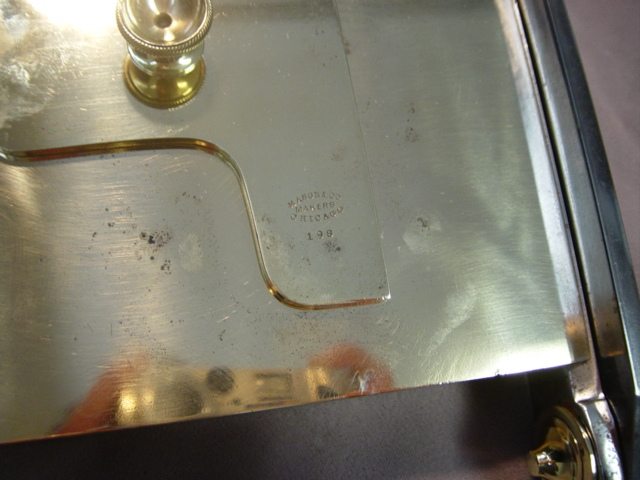 Here is a very similar Will & Finck trimmer from
probably the same time period. I do not know which came first.
Here is a very similar Will & Finck trimmer from
probably the same time period. I do not know which came first.
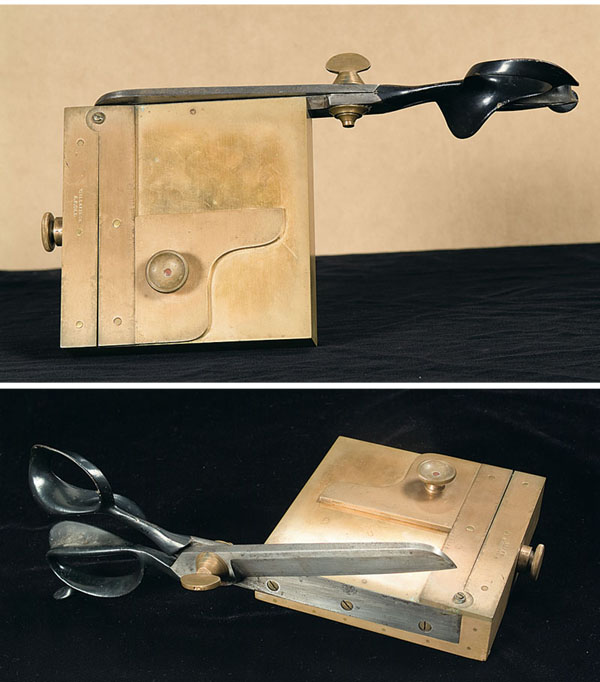 Here is a different view of a similar trimmer.
Here is a different view of a similar trimmer.
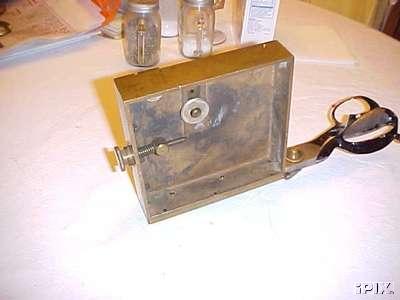
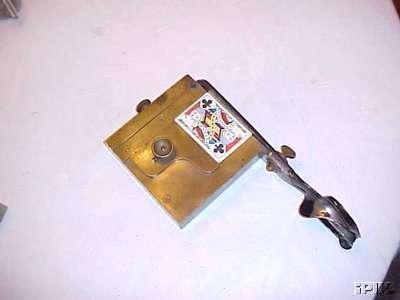
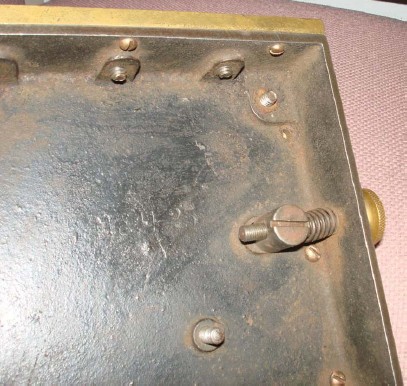 Some bases are built up from pieces of solid brass
to create the hollow block. Others are of cast iron - also hollow.
Wooden bases are likely to be a solid block of hardwood.
Some bases are built up from pieces of solid brass
to create the hollow block. Others are of cast iron - also hollow.
Wooden bases are likely to be a solid block of hardwood.
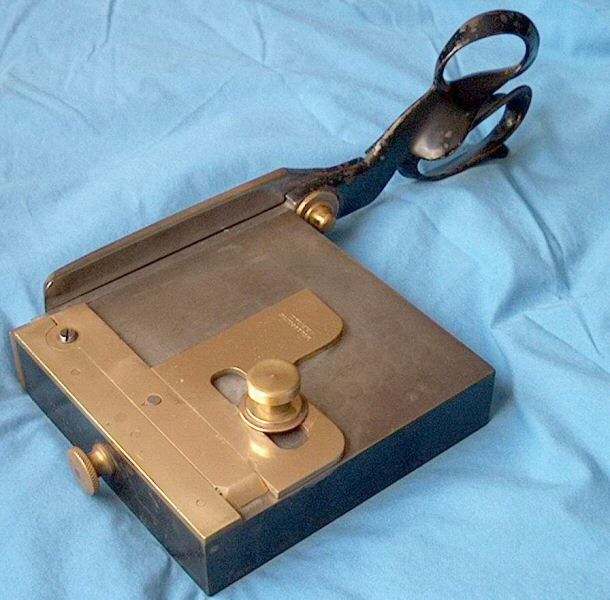
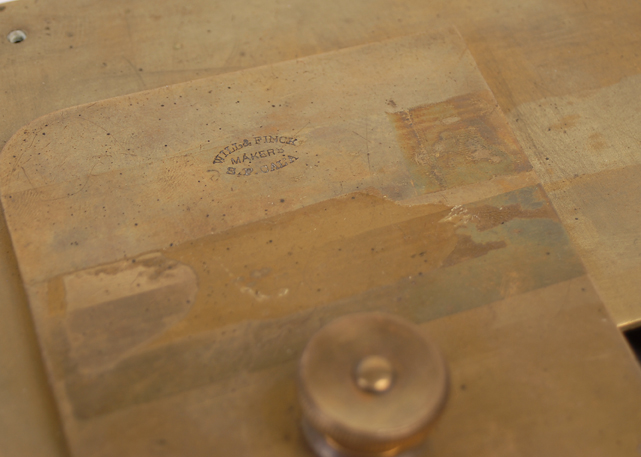 Will & Finck did not always
use the same stamp.
Will & Finck did not always
use the same stamp.
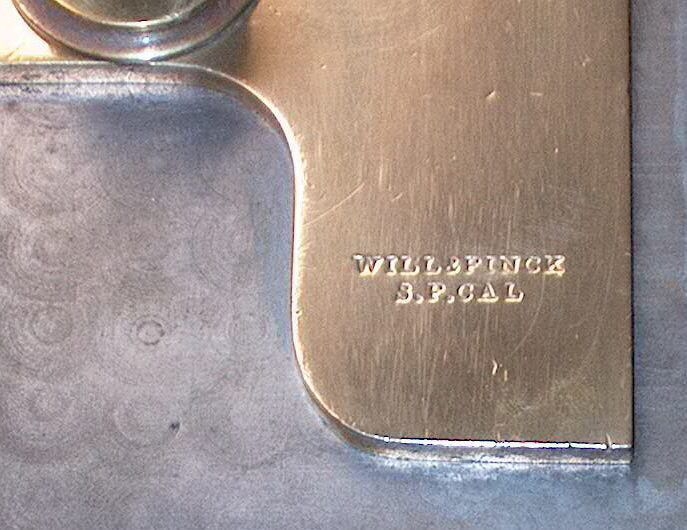
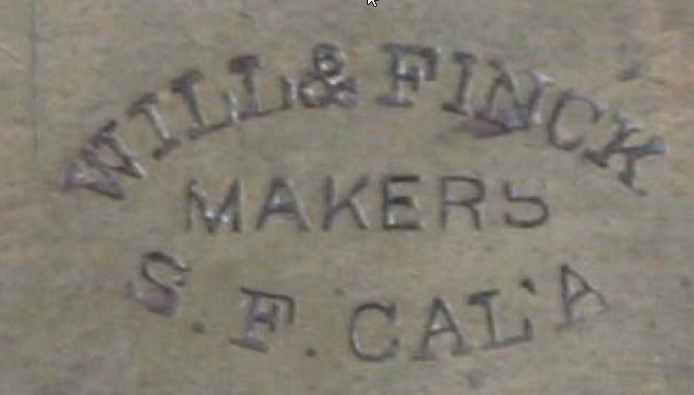
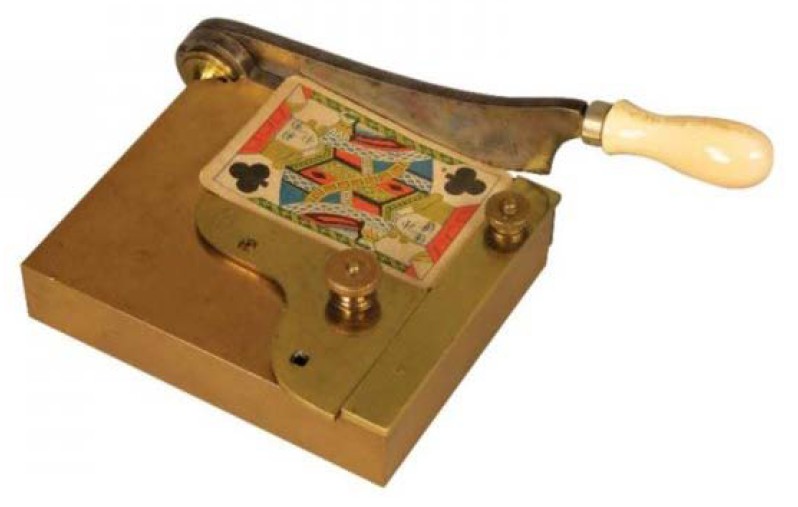
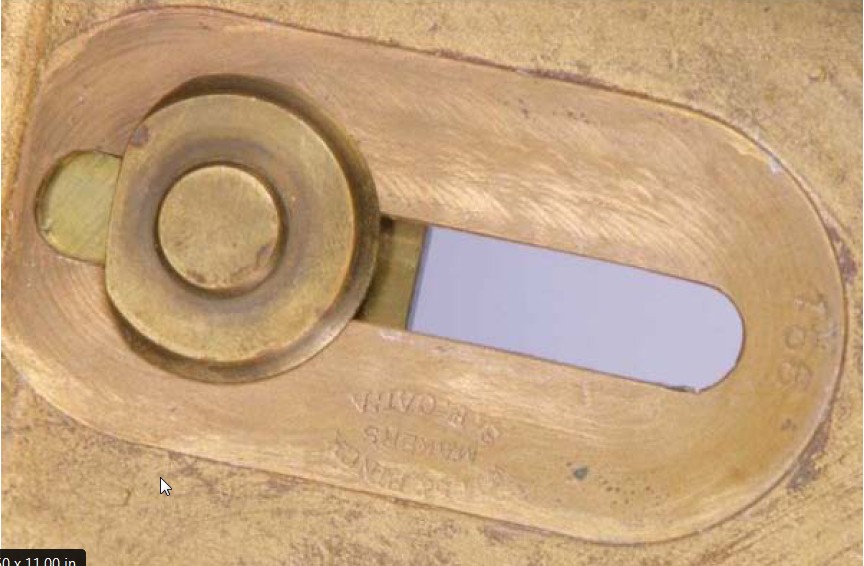
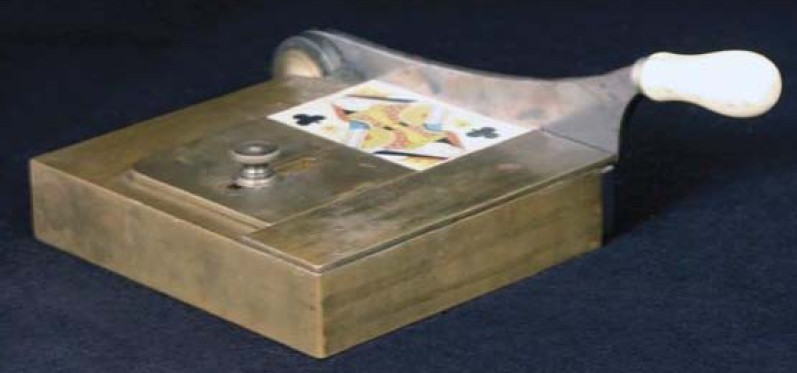
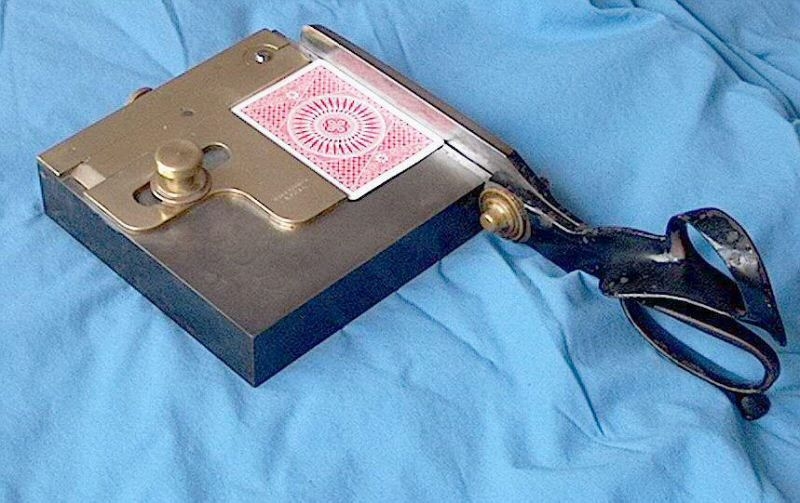
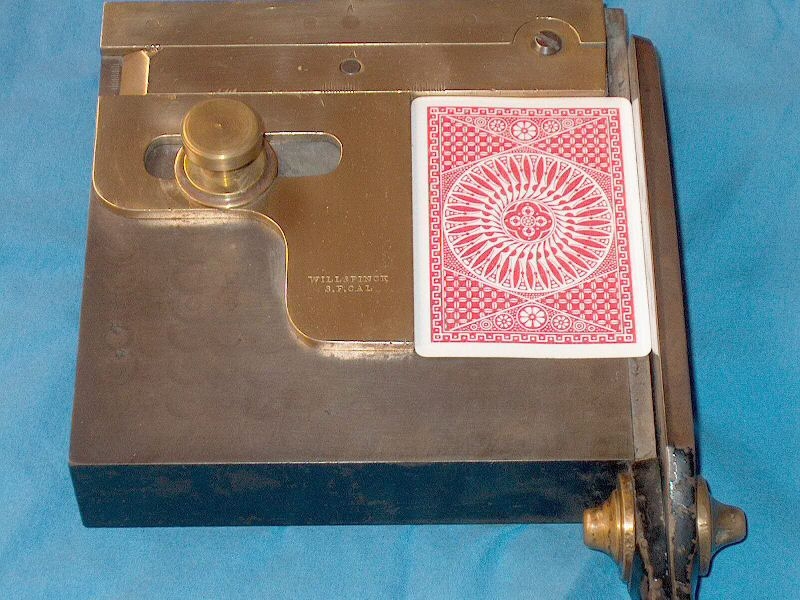 See the maker's mark?
See the maker's mark? 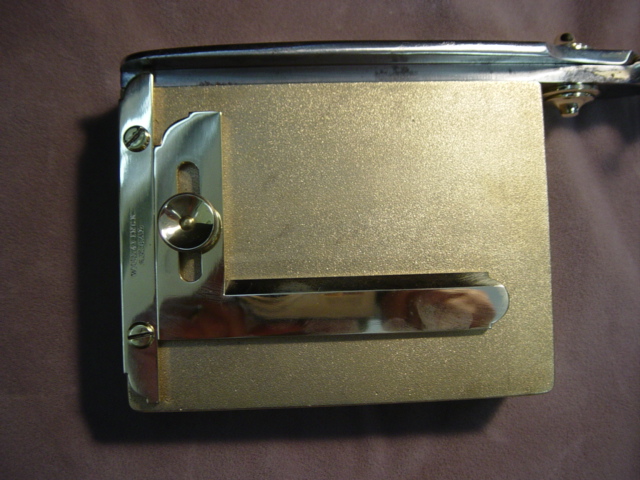 Below is another Will & Finck which is a later
refinement of the model as far as the scissors go but a step back
as far as adjustments. Such things make precise dating difficult.
Perhaps old left over parts were used or they were offering several
price ranges/features as options. I have no idea why the base
was sandblasted. The "cleaning up" on several trimmers
by a seller was not a great idea.
Below is another Will & Finck which is a later
refinement of the model as far as the scissors go but a step back
as far as adjustments. Such things make precise dating difficult.
Perhaps old left over parts were used or they were offering several
price ranges/features as options. I have no idea why the base
was sandblasted. The "cleaning up" on several trimmers
by a seller was not a great idea.
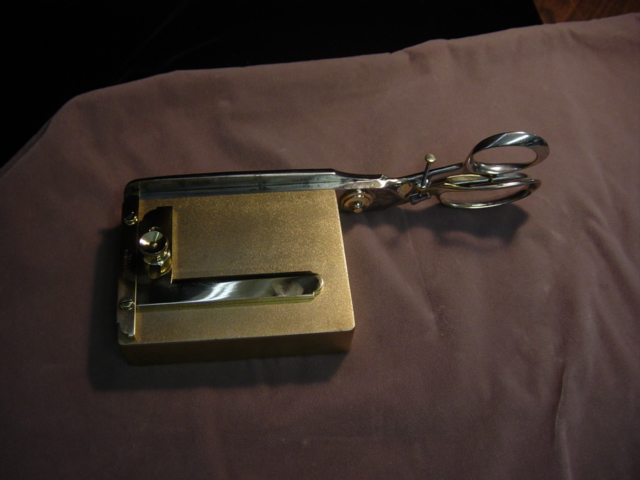 Notice the adjustment screw on the scissors handle.
This limits the length of cut. This is a very important refinement.
This works like a button hole scissors and serves the same purpose
as the length of cut adjustment screw on my trimmer.
Notice the adjustment screw on the scissors handle.
This limits the length of cut. This is a very important refinement.
This works like a button hole scissors and serves the same purpose
as the length of cut adjustment screw on my trimmer.
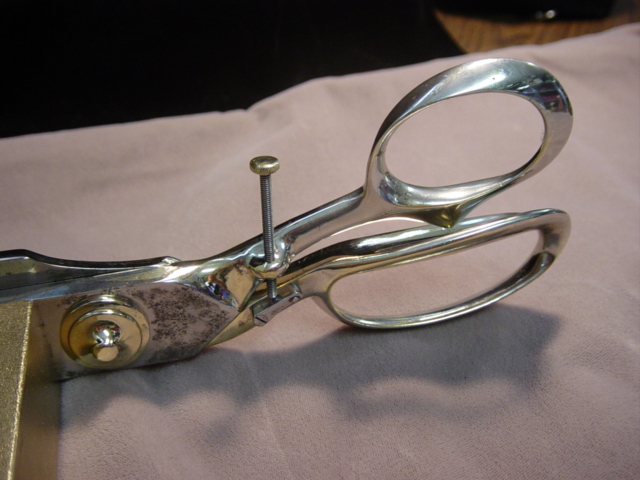
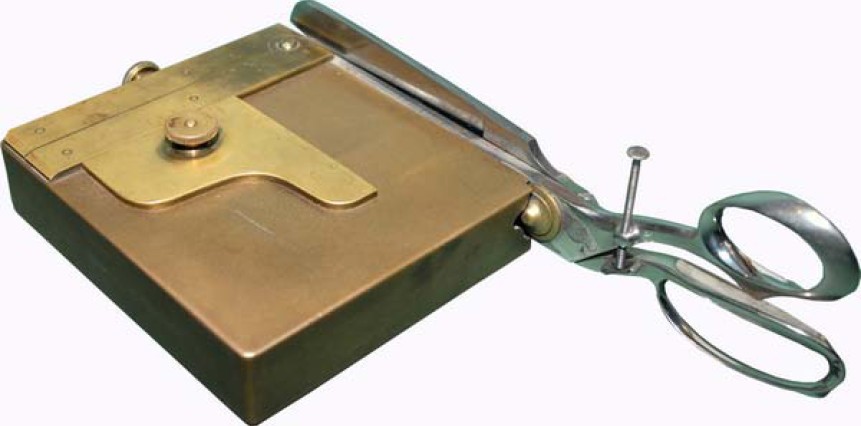
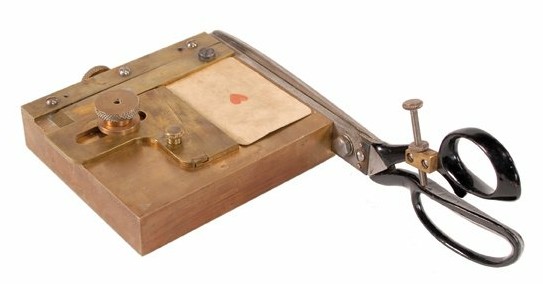 Additional Will & Finck trimmers ...
Additional Will & Finck trimmers ...
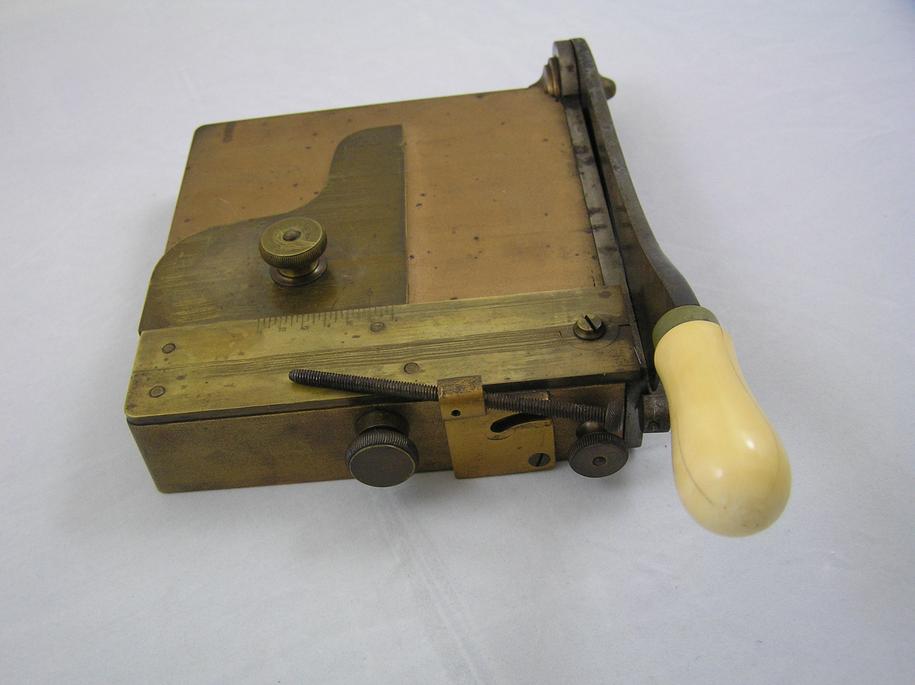
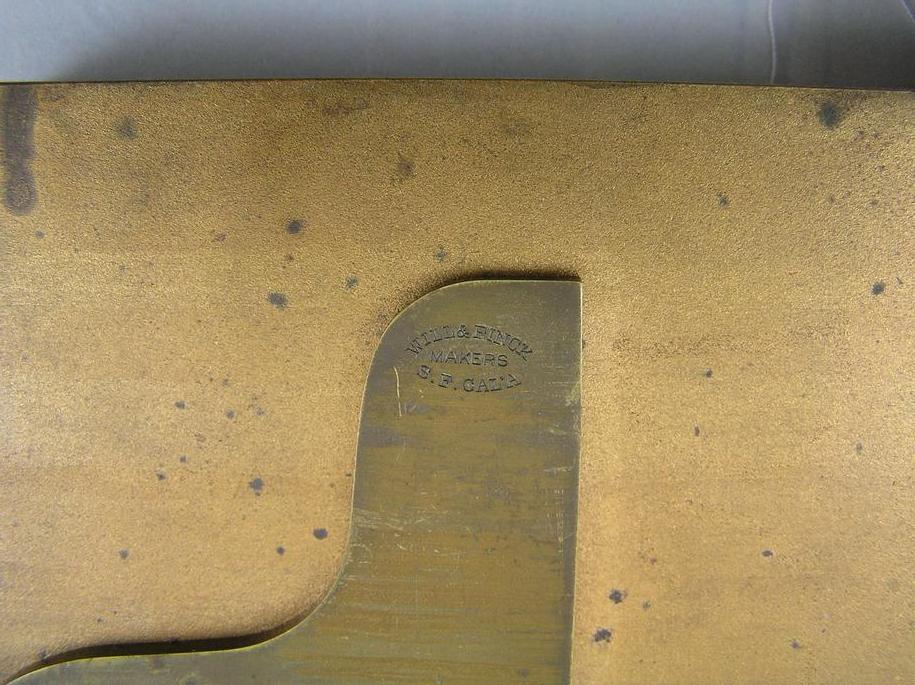 Will & Finck sometimes marked the blade as well
as the base.
Will & Finck sometimes marked the blade as well
as the base.
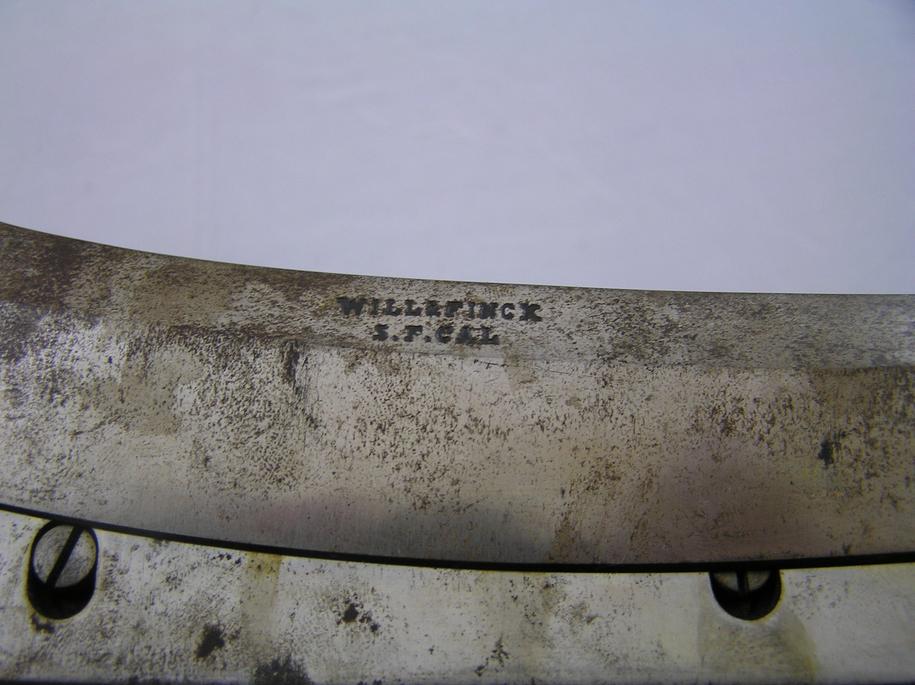 Several Bushey Trimmers ...
Several Bushey Trimmers ...
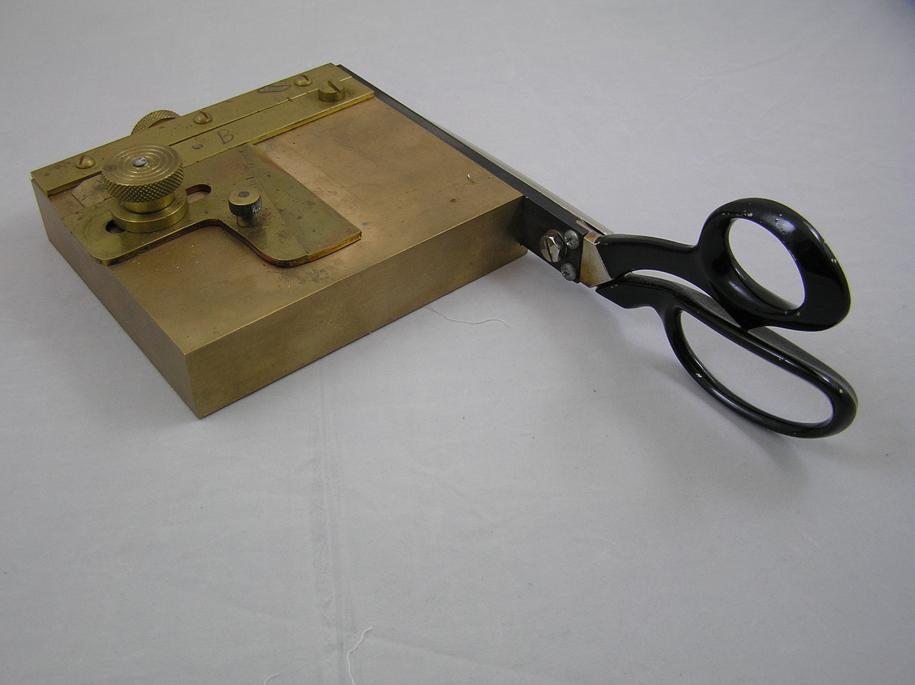
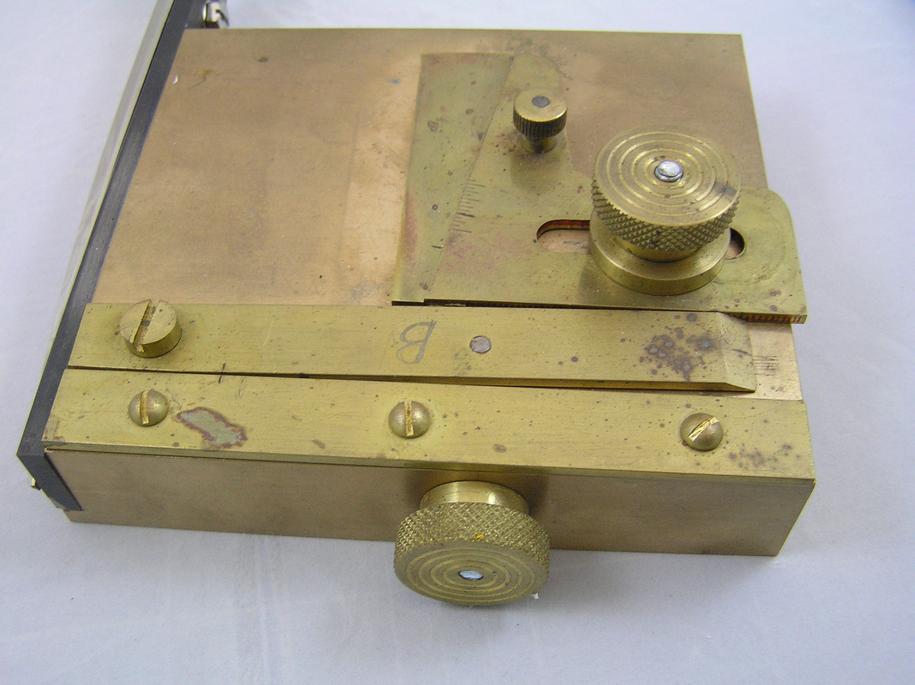 A Bushey Negative Trimmer ...
A Bushey Negative Trimmer ...
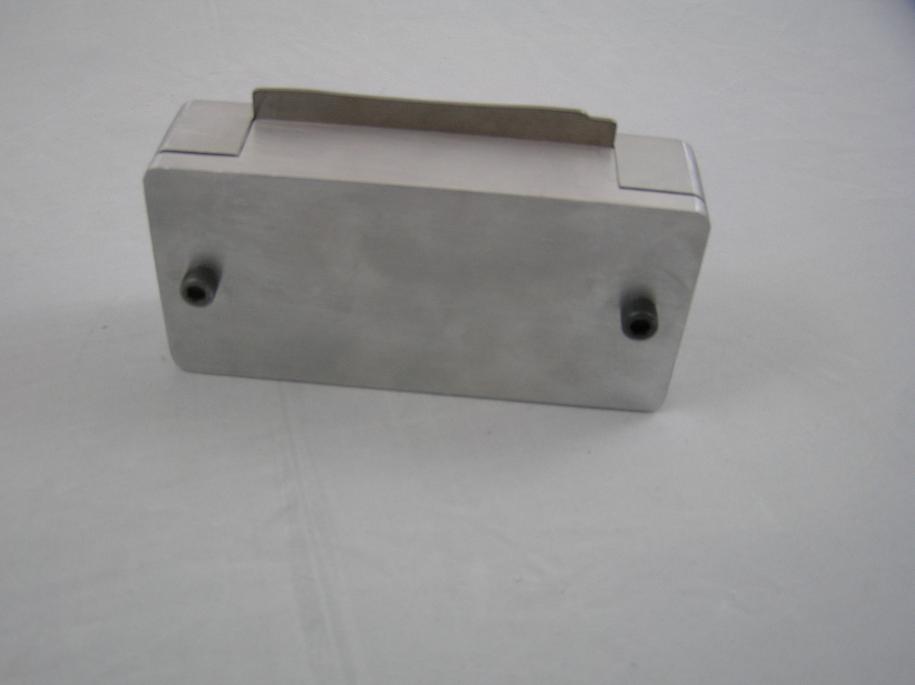
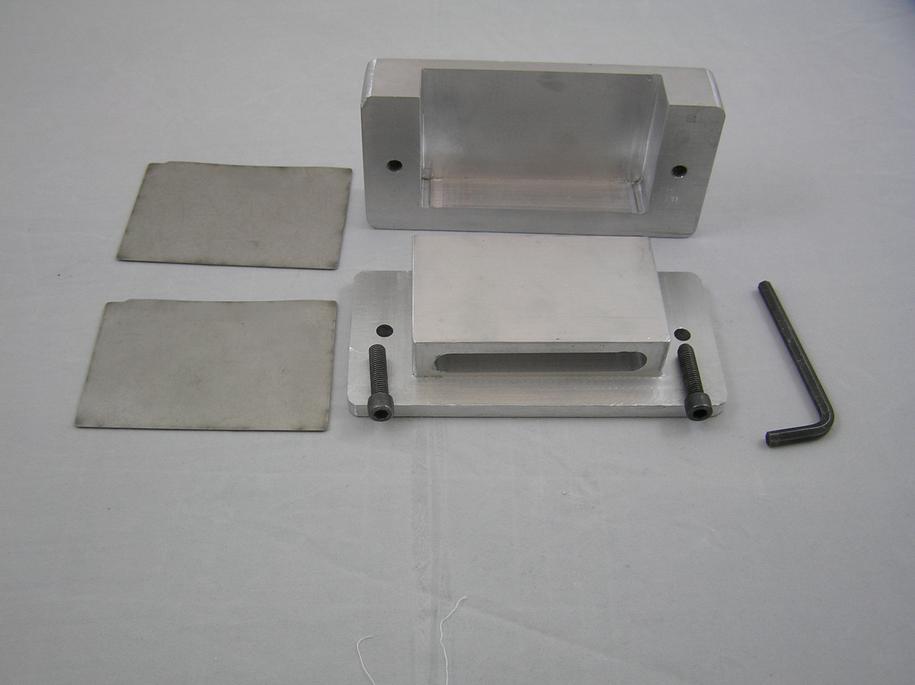
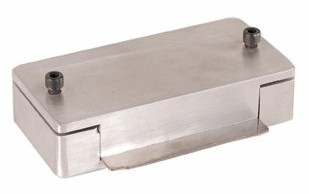 Krieger Trimmers ...
I love the micrometer adjustments on this model.
Krieger Trimmers ...
I love the micrometer adjustments on this model.
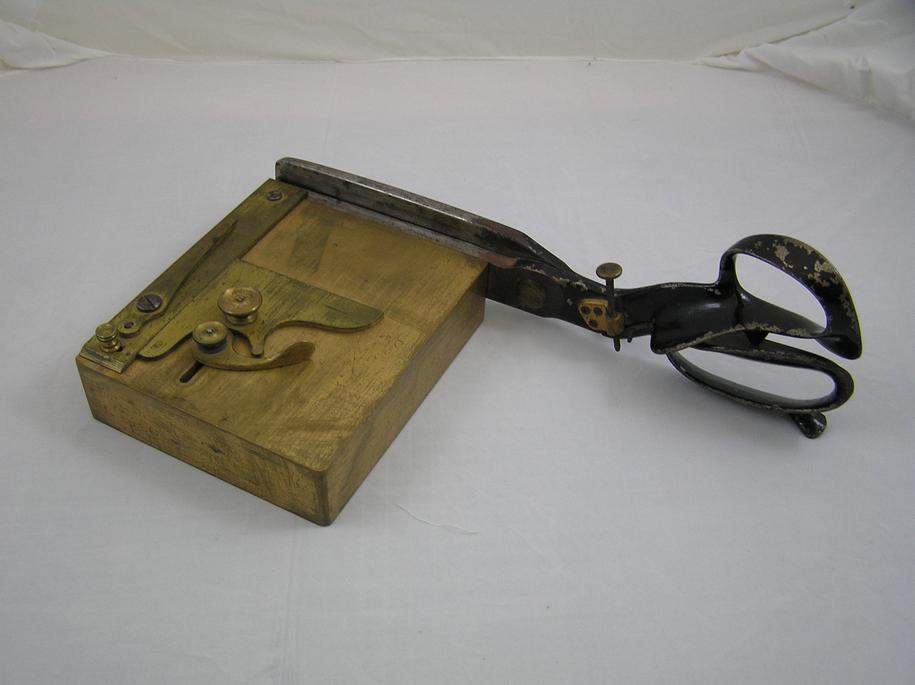
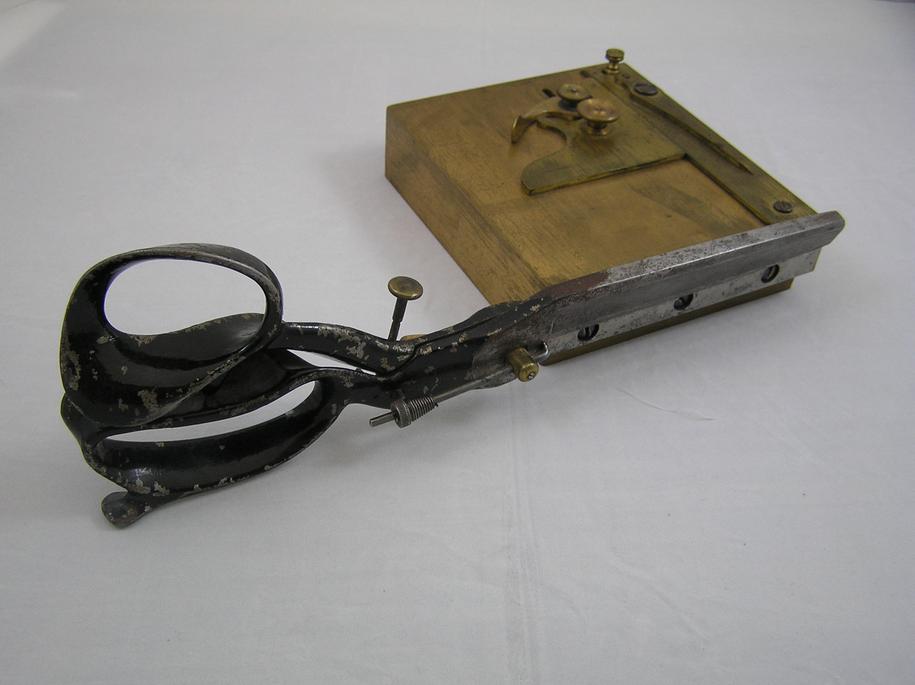 This level of adjustment is about as good as it can
get.
This level of adjustment is about as good as it can
get.
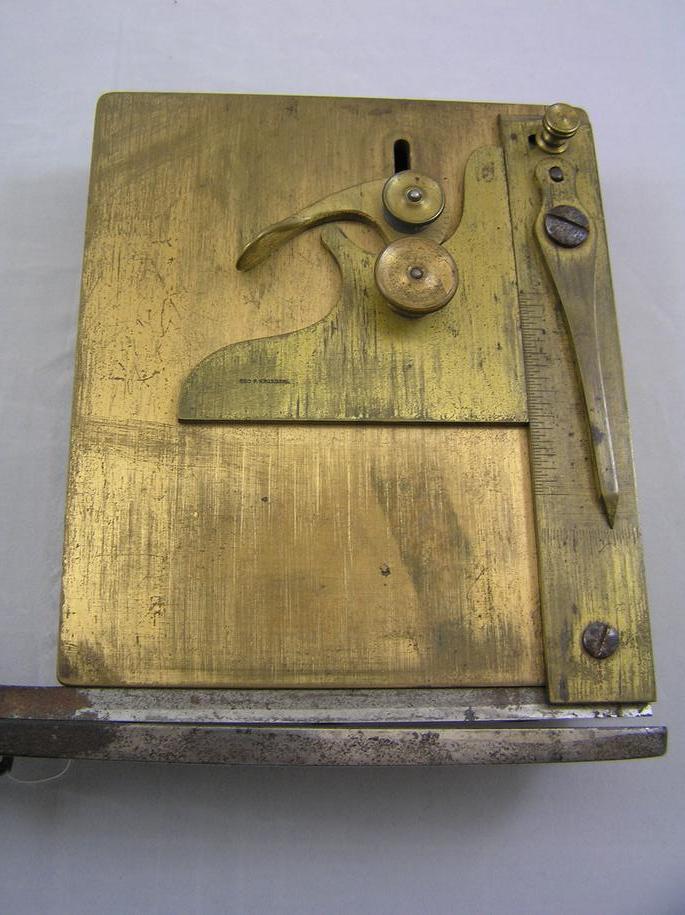
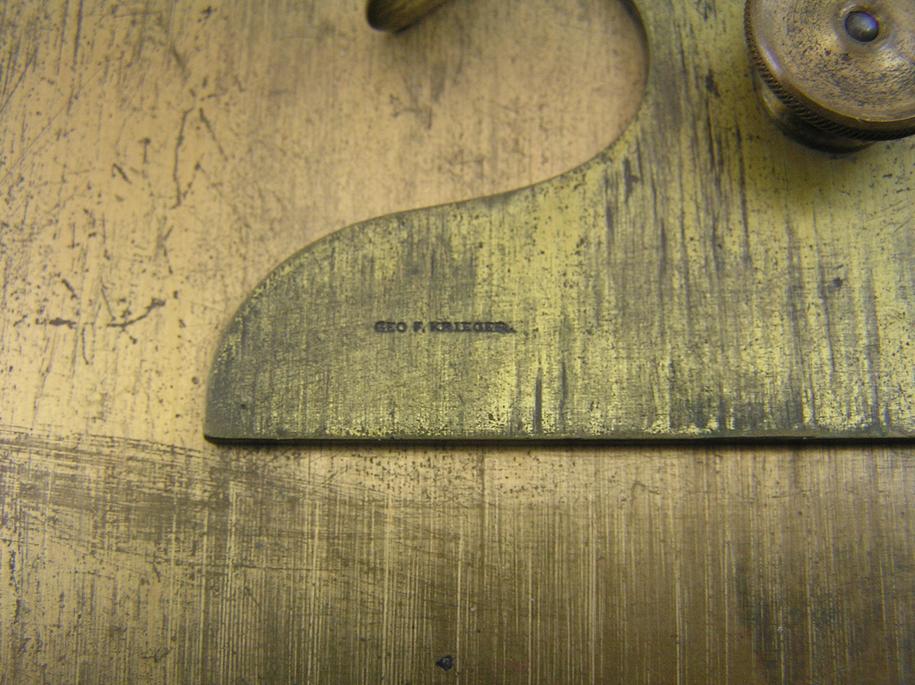
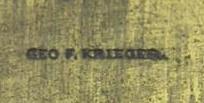
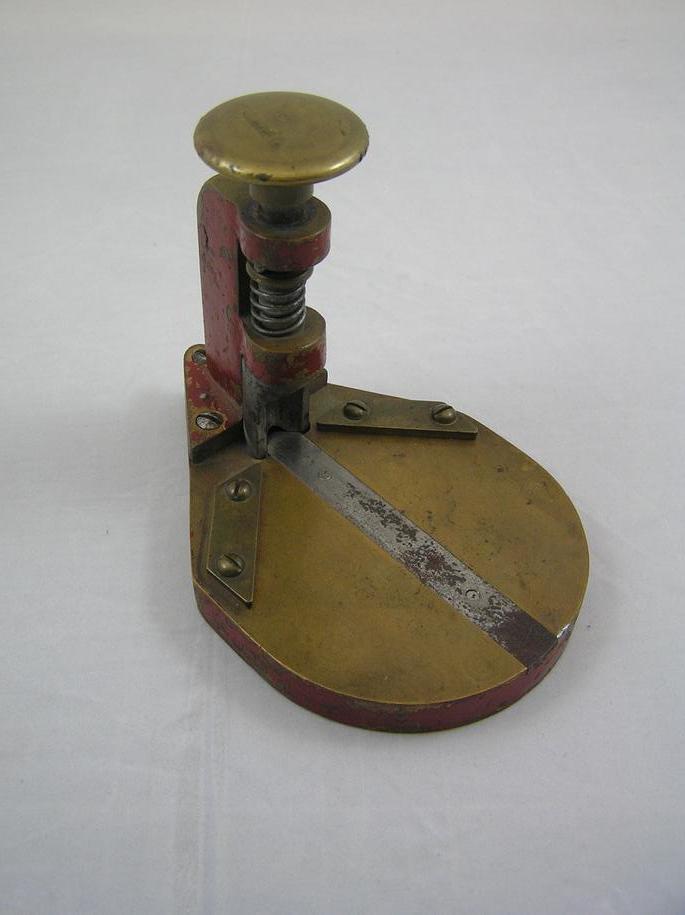 A Dailey trimmer.
A Dailey trimmer.
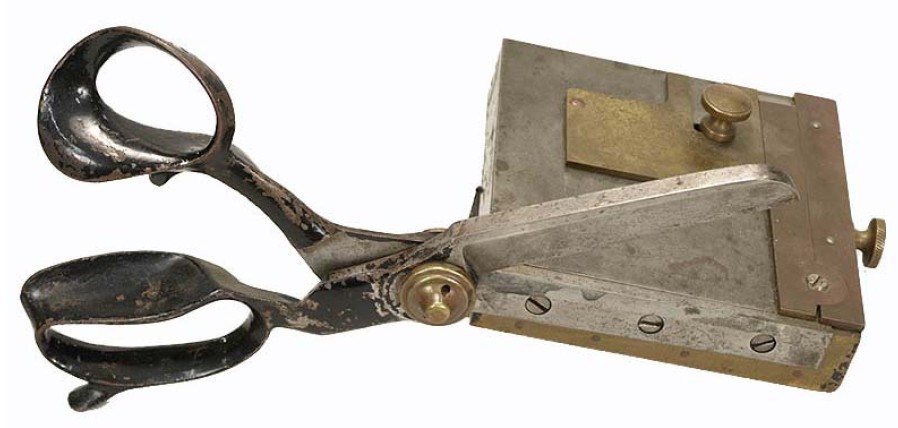 The card trimmer that I own (seen below) seems to be
the last refinement in trimmer development until recently. Notice
that this trimmer includes a micrometer on the angle adjustment
(barely visible here - it is on the bevel) and another for controling
the card width. Extremely fine adjustments are possible with this
arrangement. In addition, under the end of the scissor tip is
a length of cut adjustment screw which allows for making precise
concave cuts for a different type of stripper deck. My trimmer
set (this trimmer and matching corner rounder) is stamped M&H
on the bottom.
The card trimmer that I own (seen below) seems to be
the last refinement in trimmer development until recently. Notice
that this trimmer includes a micrometer on the angle adjustment
(barely visible here - it is on the bevel) and another for controling
the card width. Extremely fine adjustments are possible with this
arrangement. In addition, under the end of the scissor tip is
a length of cut adjustment screw which allows for making precise
concave cuts for a different type of stripper deck. My trimmer
set (this trimmer and matching corner rounder) is stamped M&H
on the bottom.
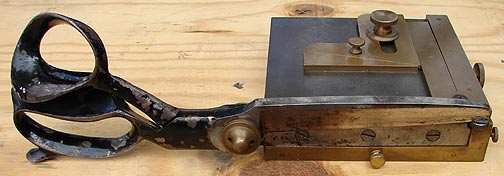
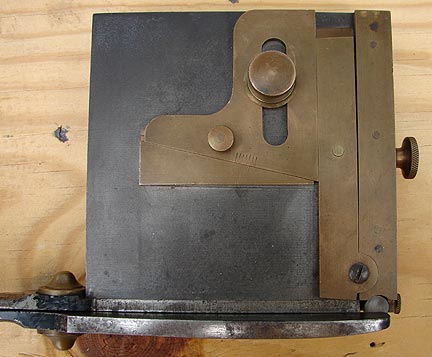 Here are better shots of the length of cut adjustment
screw.
Here are better shots of the length of cut adjustment
screw.
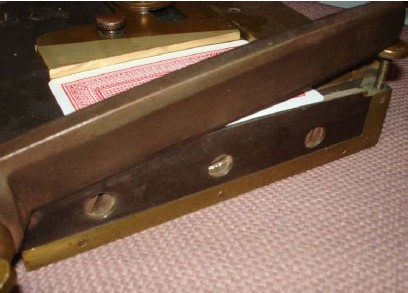
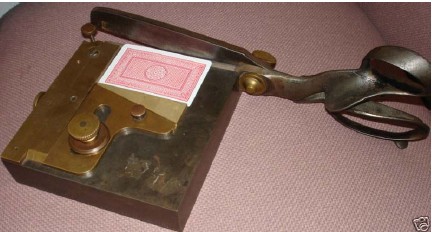
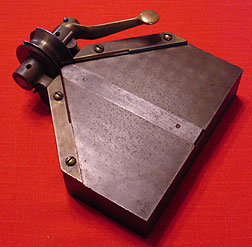 The matching corner
rounder.
Note: I am in the process of creating an epub
on using this model of trimmer. It should be available this fall
sometime - probably sold through Barnes and Nobel. In addition,
I will most likely be creating epubs on making your own card trimmer
and Kepplinger style holdout.
The matching corner
rounder.
Note: I am in the process of creating an epub
on using this model of trimmer. It should be available this fall
sometime - probably sold through Barnes and Nobel. In addition,
I will most likely be creating epubs on making your own card trimmer
and Kepplinger style holdout.
Here is a modern whole new approach to the problem
of trimming cards ...
The Stripper Jig
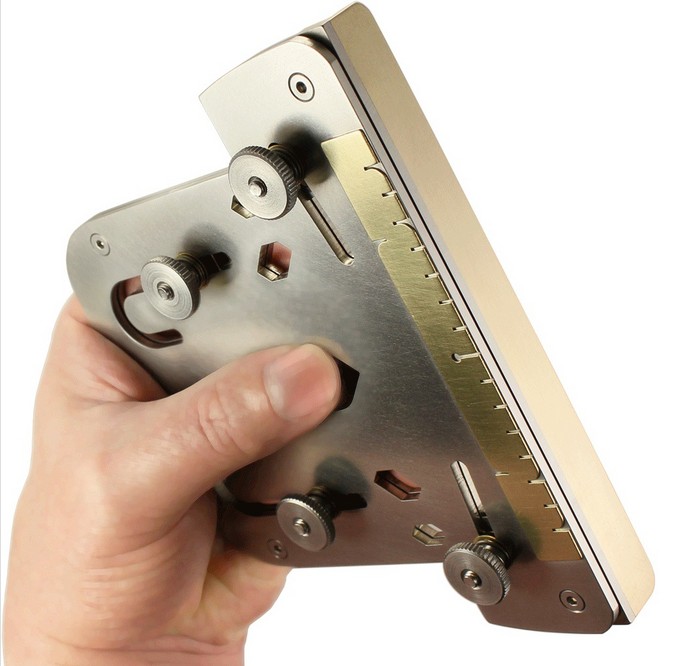
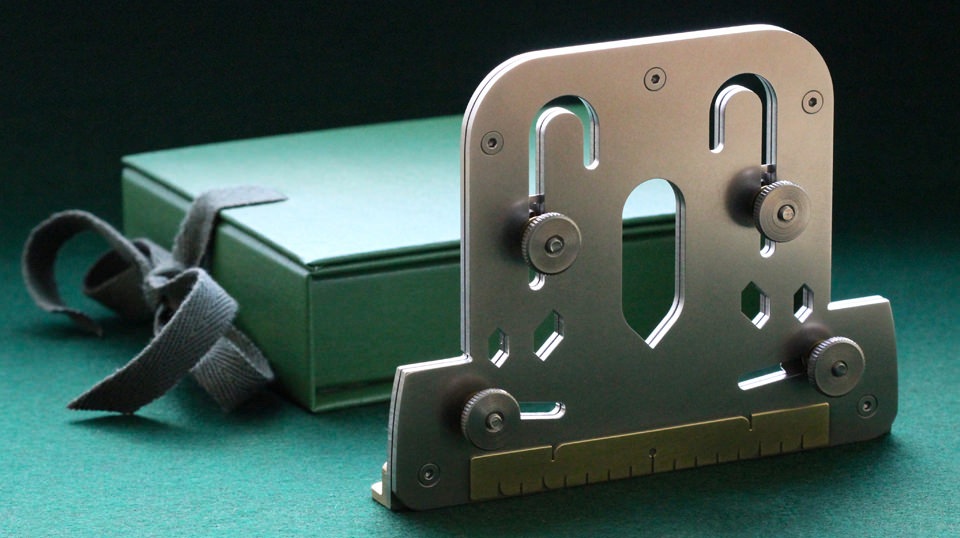 You may see details of the Stripper Jig here.
You may see details of the Stripper Jig here.
Recently Owen Magic Supreme and Joe Porper have produced
card trimmers.
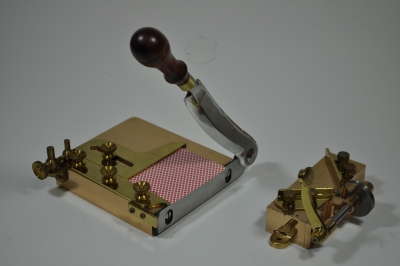 This is the Owen version.
This is the Owen version.
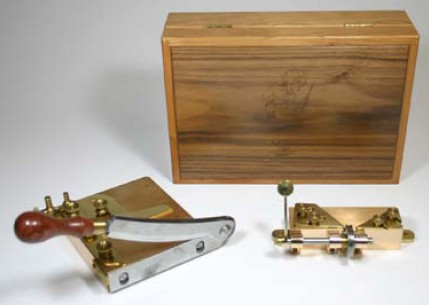
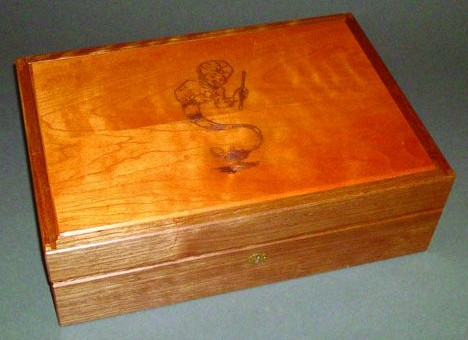
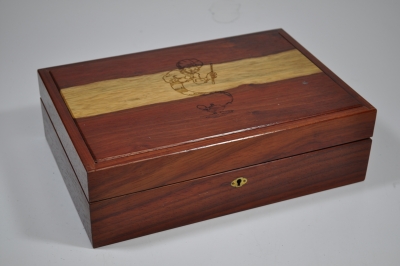
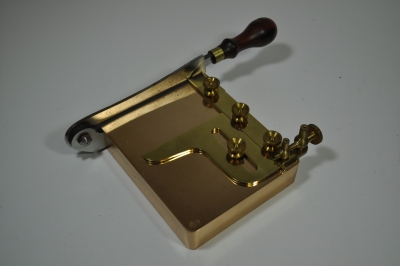
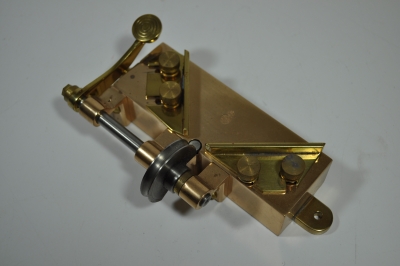
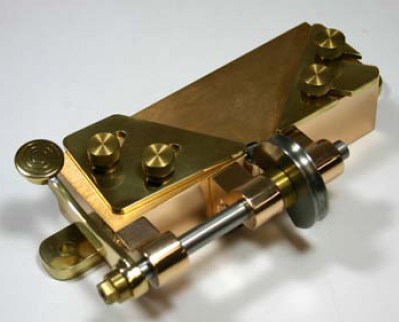
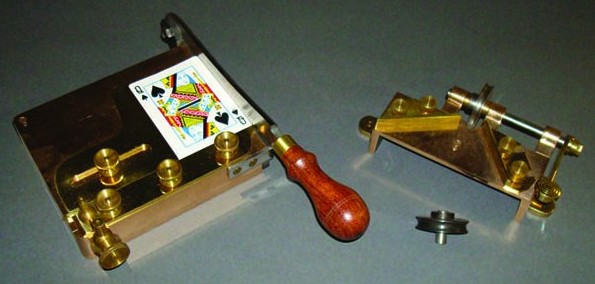 And this is Joe Porper's version.
And this is Joe Porper's version.
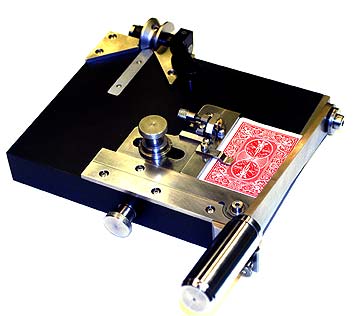
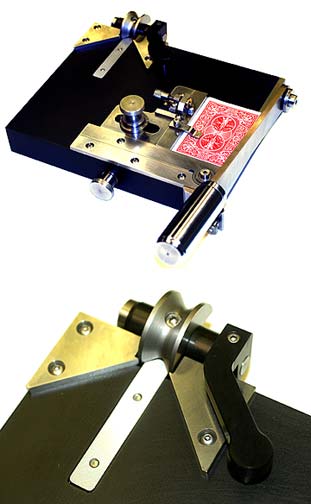
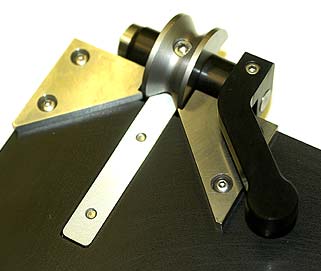 Below is another modern trimmer - maker unknown.
Below is another modern trimmer - maker unknown.
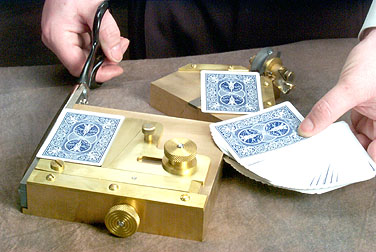 Feedback
on dating such goodies is always welcome.
Feedback
on dating such goodies is always welcome.
Below are several interesting images.
An owner cut up a small machinist rule and added it
to this trimmer.
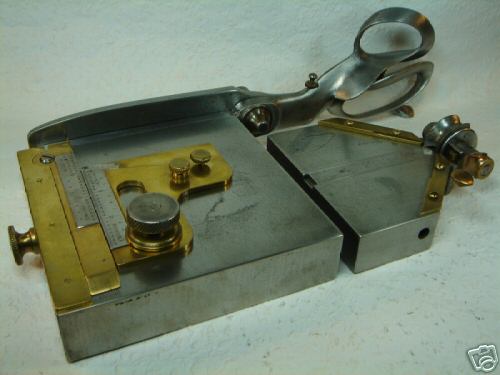
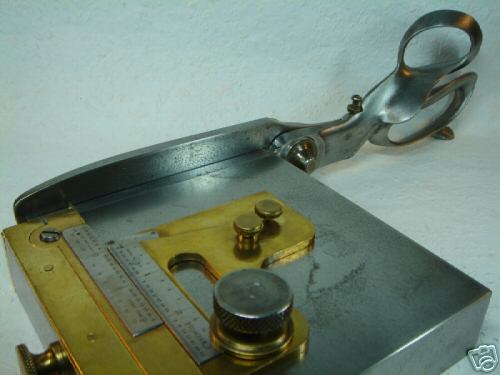
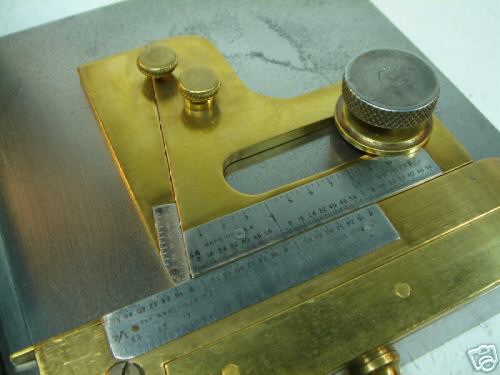 This trimmer has a pressure plate to help prevent a
card from buckling during trimming. I suggest that a flat block
ceramic magnet would serve the same purpose for those with a cast
iron block on their trimmer.
This trimmer has a pressure plate to help prevent a
card from buckling during trimming. I suggest that a flat block
ceramic magnet would serve the same purpose for those with a cast
iron block on their trimmer.
 Note the adjustment screw on the
handle.
The one on the left below looks home made while the
one on the right may not be a card trimmer at all (no adjustment
controls).
Note the adjustment screw on the
handle.
The one on the left below looks home made while the
one on the right may not be a card trimmer at all (no adjustment
controls).
 In addition to the above examples, there are many variations
in the corner rounders which might also help in dating these devices.
Though similar, these two have different lever handles, different
bearings, and different guide strips along the top edges.
In addition to the above examples, there are many variations
in the corner rounders which might also help in dating these devices.
Though similar, these two have different lever handles, different
bearings, and different guide strips along the top edges.
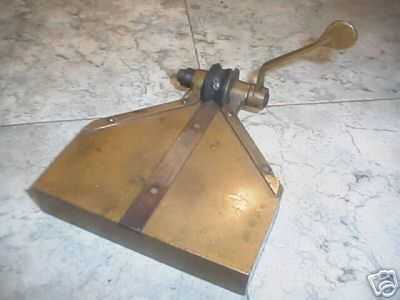
 And here is a different spring mounting.
And here is a different spring mounting.
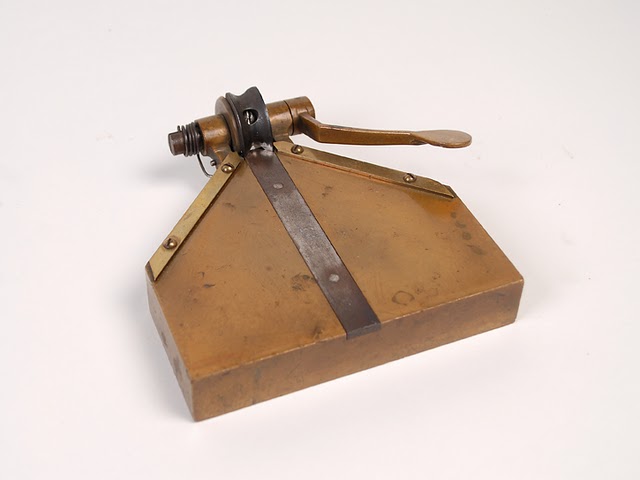 The corner rounder on the right below is a Will &
Finck.
The corner rounder on the right below is a Will &
Finck.
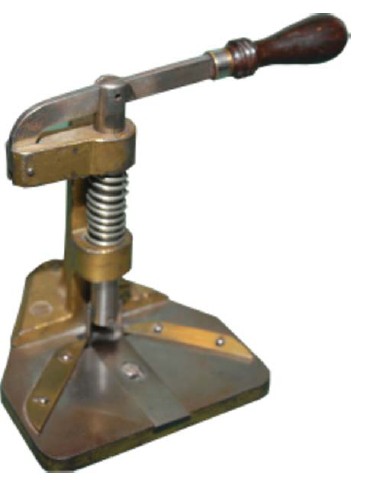
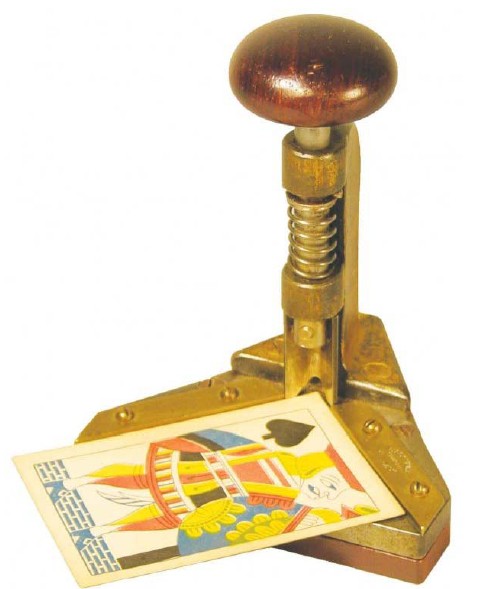
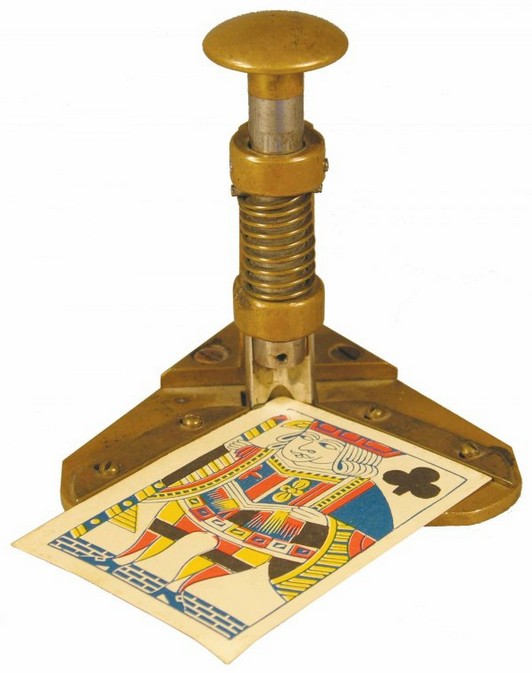 A George Mason
corner rounder.
A George Mason
corner rounder.
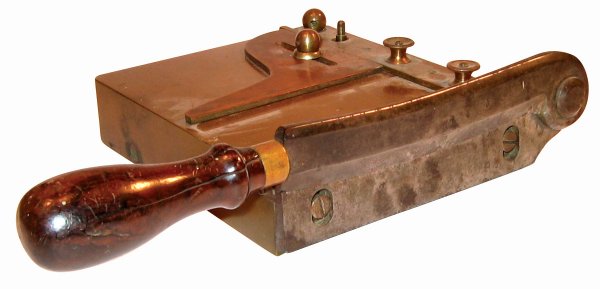
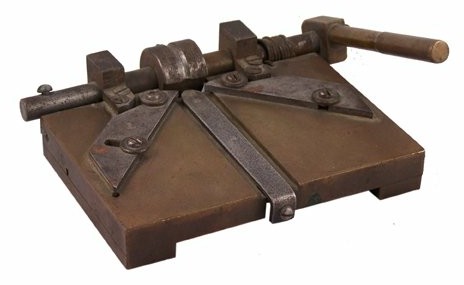
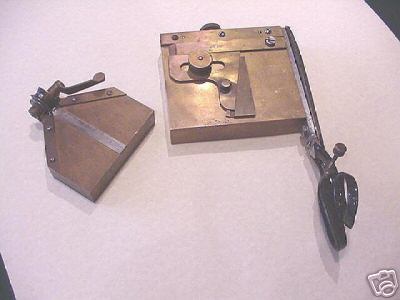 Since some trimmers are marked and some not but seem
to use common parts (scissors/base block), I wonder if makers
supplied unmarked trimmers to various gambler's supply houses
that they could claim as their own. Such marketing has been going
on for a long time and may have been done with card trimmers.
A study of the Graham company and exactly how they fit into this
picture would be interesting as they appear to have been such
a supplier.
More to come.......
If
you want to make your own inexpensive card trimmer, click here.
Since some trimmers are marked and some not but seem
to use common parts (scissors/base block), I wonder if makers
supplied unmarked trimmers to various gambler's supply houses
that they could claim as their own. Such marketing has been going
on for a long time and may have been done with card trimmers.
A study of the Graham company and exactly how they fit into this
picture would be interesting as they appear to have been such
a supplier.
More to come.......
If
you want to make your own inexpensive card trimmer, click here.
























 Will & Finck did not always
use the same stamp.
Will & Finck did not always
use the same stamp.


















 The matching corner
rounder.
The matching corner
rounder.

 This is the Owen version.
This is the Owen version.













 Note the adjustment screw on the
handle.
Note the adjustment screw on the
handle.





 A George Mason
corner rounder.
A George Mason
corner rounder.

